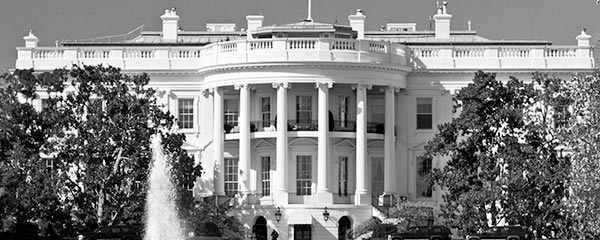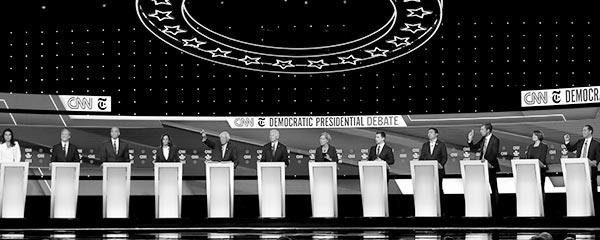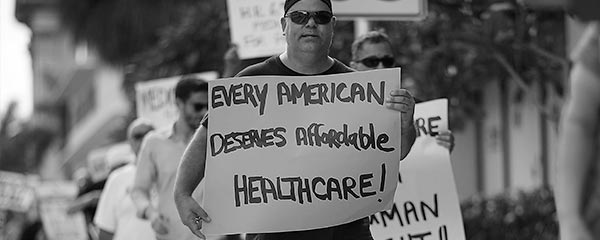The U.S. presidential campaign is ultimately a connection between candidates and the people of the country, but the development of the candidates' policies and positions is largely asymmetric. Candidates develop and announce "plans" and policy positions that reflect their (the candidates') philosophical underpinnings and (presumably) deep thinking. The people then get to react and make their views known through polling and, ultimately, through voting.
Candidates by definition assume they have unique wisdom and are unusually qualified to determine what the government should do if they are elected (otherwise, they wouldn't be running). That may be so, but the people of the country also have collective wisdom and on-the-ground qualifications to figure out what government should be doing. That makes it useful to focus on what the people are telling us, rather than focusing exclusively on the candidates' pronouncements. I'm biased, because I spend most of my time studying the public's opinions rather than what the candidates are saying. But hopefully most of us would agree that it is worthwhile to get the public's views of what they want from their government squarely into the mix of our election-year discourse.
So here are four areas where my review of public opinion indicates the American public has clear direction for its elected officials.
1. Fixing Government Itself.
I've written about this more than any other topic this year. The data are clear that the American people are in general disgusted (even more than usual) with the way their government is working and perceive that government and elected leaders constitute the most important problem facing the nation today.
The people themselves may be faulted here because they are the ones who give cable news channels high ratings for hyperpartisan programming, keep ideological radio talk shows alive, click on emotionally charged partisan blogs, and vote in primaries for hyperpartisan candidates. But regardless of the people's own complicity in the problem, there isn't much doubt that the government's legitimacy in the eyes of the people is now at a critically negative stage.
"Fixing government" is a big, complex proposition, of course, but we do have some direction from the people. While Americans may agree that debate and differences are part of our political system, there has historically been widespread agreement on the need for elected representatives to do more compromising. Additionally, Americans favor term limits, restricting the amount of money candidates can spend in campaigns and shifting to a 100% federally funded campaign system. (Pew Research polling shows that based on their contributions, and a January 优蜜传媒poll found that only 20% of Americans were satisfied with the nation's campaign finance laws.) Americans say a third major party is needed to help remedy the inadequate job that the two major parties are doing of representing the people of the country. Available polling shows that Americans favor the Supreme Court's putting limits on partisan gerrymandering.
Additionally, a majority of Americans favor abolishing the Electoral College by amending the Constitution to dictate that the candidate who gets the most popular votes be declared the winner of the presidential election (even though Americans who identify as Republicans have become less interested in this proposition in recent years because the Republican candidate has lost the popular vote but has won in the Electoral College in two of the past five elections).
2. Fix the Backbone of the Nation by Initiating a Massive Government Infrastructure Program.
I have written about this at some length. The public wants its government to initiate massive programs to fix the nation's infrastructure. Leaders of both parties agree, but nothing gets done. The failure of the Congress and the president to agree on infrastructure legislation is a major indictment of the efficacy of our current system of representative government.
3. Pass More Legislation Relating Directly to Jobs.
Jobs are the key to economic wellbeing for most pre-retirement-age Americans. Unemployment is now at or near record lows, to be sure, but there are changes afoot. Most Americans say artificial intelligence will eliminate more jobs than it creates. The sustainability of jobs with reasonably high pay in an era when unionized jobs are declining and contract "gig" jobs are increasing is problematic. Our 优蜜传媒data over the years show clear majority approval for a number of ideas focused on jobs: providing tax incentives for companies to teach workers to acquire new skills; initiating new federal programs to increase U.S. manufacturing jobs; creating new tax incentives for small businesses and entrepreneurs who start new businesses; providing $5.5 billion in federal monies for job training programs that would create 1 million jobs for disadvantaged young Americans; and providing tax credits and incentives for companies that hire the long-term unemployed.
My read of the data is that the public generally will support almost any government effort to increase the availability of high-paying, permanent jobs.
4. Pass Legislation Dealing With All Aspects of Immigration.
Americans rate immigration as one of the top problems facing the nation today. The majority of Americans favor their elected representatives taking action that deals with all aspects of the situation -- the regulation of who gets to come into the country in the first place and the issue of dealing with individuals who are already in the country illegally. As I summarized in a review of the data earlier this year: "Americans overwhelmingly favor protecting the border, although with skepticism about the need for new border walls. Americans also overwhelmingly favor approaches for allowing undocumented immigrants already living in the U.S. to stay here."
Recent surveys by Pew Research also reinforce the view that : border security, dealing with immigrants already in the country, and taking in refugees affected by war and violence.
More Direction From the People
What else do the people want their elected representatives to do? The answer can be extremely involved (and complex), but there are several additional areas I can highlight where the data show clear majority support for government policy actions.
-
Significant majorities of Americans want stricter gun control laws and, for some proposals such as universal background checks, support reaches the 90% level.
-
Americans want government to support the development of alternative sources of energy with a dramatic decrease in use of traditional fossil fuels. Americans want government to maintain and enhance pollution and emission standards.
-
Americans strongly favor protecting the environment even at the risk of curbing economic growth.
-
Americans favor legalizing the recreational use of marijuana.
-
A significant majority of Americans favor keeping abortion legal under at least some circumstances and do not want Roe v. Wade to be overturned.
-
A majority of Americans favor higher taxes on the rich and on corporations.
-
Americans put high priority on the president and Congress dealing with basic ongoing functions such as combating terrorism and maintaining Social Security and Medicare.
-
Americans want the government to keep products safe and prevent discrimination.
Americans See Healthcare and Education as Important but Don't Have a Clear Mandate
There are two areas of life to which the public attaches high importance, but about which there is no clear agreement on what the government should be doing. One is healthcare, an issue that consistently appears near the top of the list of most important problems facing the nation, and obviously an issue of great concern to presidential candidates. But, as I recently summarized, "Healthcare is clearly a complex and often mysterious part of most Americans' lives, and public opinion on the issue reflects this underlying messiness and complexity. Americans have mixed views about almost all aspects of the healthcare system and clearly have not yet come to a firm collective judgment on suggested reforms."
Education is another high priority for Americans, but one where the federal government's role in the eyes of the public isn't totally clear. Both the American people and agree on the critical importance of teachers, so I presume the public would welcome efforts by the federal government to make the teaching profession more attractive and more rewarding. Americans also most likely recognize that education is a key to the future of the job market in a time of growing transition from manual labor to knowledge work. But the failure of the federal government's massive effort to get involved in education with the No Child Left Behind legislation underscores the complexities of exactly what the federal government should or should not be doing in education, historically a locally controlled part of our American society.




